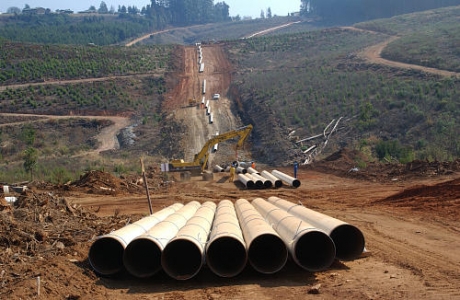ISLAMABAD: Pakistan and Russia have formally signed a Memorandum of Understanding (MoU) on Thursday in Moscow for the construction of an offshore gas pipeline and the supply of gas to Pakistan.
Reportedly, after signing of MoU, Pakistan will receive 500 million to 1 billion cubic feet of gas on a daily basis once the project is completed and Russia’s Public Joint Stock Company Gazprom will work with Pakistan’s state-owned Inter State Gas Systems (ISGS) together on the $10 billion project which is aimed at fulfilling Pakistan’s gas needs.
Russian energy giant Gazprom will conduct a feasibility study of the project and after conducting the feasibility study, the final cost of the gas supply project will be assessed by Gazprom while the project will be constructed by Russia on a build, own, operate and transfer basis.
Sources at the petroleum division informed that it is expected that the pipeline will be completed in three to four years starting from March 2019.
They added that this gas pipeline deal between the two countries will serve China Pakistan Economic Corridor (CPEC), which is now in its industrialization phase and is in need of gas for its Special Economic Zones (SEZs).
It was also learnt from sources that after the construction of the gas pipeline, Russia will initially supply 500 million to 1.5 billion cubic feet per day to Pakistan while in future, Russia will also be able to supply gas to India via Pakistan through land or sea routes. They added that Russia will also sell Turkmenistan’s and Iran’s gas to Pakistan and India via Iran at cheap rates in comparison to the price of Liquefied Natural Gas (LNG).
It is relevant to mention that former federal cabinet under the chairmanship of former prime minister Shahid Khaqqan Abbasi had already given the go-ahead to formally sign an agreement with Russia for the supply of gas and construction of an offshore gas pipeline.
Similarly, Pakistan’s federal cabinet had also allowed Gazprom to conduct a feasibility study at its own cost and risk and Russia had already shown willingness to finance the feasibility study of the project and nominated Gazprom to implement the project.
Likewise, Pakistan and Russia had already reached an understanding on signing the offshore gas pipeline deal during former prime minister Shahid Khaqan Abbasi’s visit to Sochi, Russia. And, so far, the two sides remained poised to ink a memorandum of understanding (MoU) for the offshore pipeline
After the signing of the MoU between the two countries, Russia, which controls and manages huge gas reserves in energy-rich Iran, and Turkmenistan, will provide gas to Pakistan via Iran and Russian Gazprom will construct the gas pipeline inside Iran and Pakistan. They said though Iran has no objection with the Pak-Russia gas deal, however, Pakistan will have to revive Gwadar-Nawabshah gas pipeline project to get Russian gas via Iran and for ensuring energy security of the country, said sources.
At present, Russia has also been a prominent gas exporter to the European Union (EU) countries and Turkey despite US sanctions as the European bloc continued to make imports to meet its energy needs.
However, due to the Crimea stand-off, Moscow is, to some extent, under the pressure and fears that it may lose energy consumers in Europe. Considering Pakistan and India as alternate markets, Russia is now making efforts to capture these markets since Russia has shown readiness to export gas by laying an offshore pipeline through the Gwadar Port to Pakistan and India.




